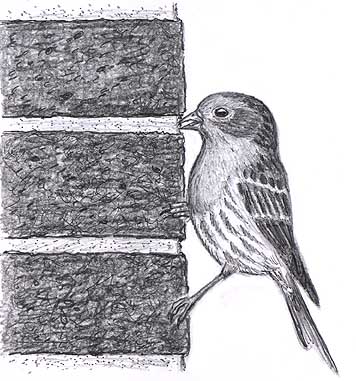
Dear Bird Folks:
Several times this winter I have noticed that finches, mostly house finches, have been pecking away at the mortar joints on my chimney. Even when my feeders are filled with your delicious birdseed, they still want to eat my chimney. Why are they doing this and what is going to happen to my chimney?
– Glenn, Brewster
Sounds to me Glenn,
Like you have a flock of “brickpeckers” coming to your yard. Not to be confused with the common woodpeckers of the suburbs, brickpeckers are usually found in large cities, where they feed on the endless supply of bricks and cement. For years people have blamed structural decay of the city buildings on pollution. Now it turns out that much of the building damage is caused by the cement-eating brickpeckers.
Are you buying any of this Glenn? I didn’t think so. But I’m sure that there is at least one guy in Brewster thinking, “Yeah, I’ve seen those birds before. See Martha, I told you we had brickpeckers. You’d better call up and increase our chimney insurance.
Very interesting observation about house finches picking at your chimney. As weird as it sounds, those finches were just adding to their balanced diet. The seed that we offer birds, even though delicious, is not a complete diet for them. Most birds eat a variety of items, probably more than most of us realize. Hummingbirds, for example, love to drink from our sugar water feeders, but they wouldn’t live long if that was their only source of food. Insects and tree sap are also important parts of a hummingbird’s diet. Just about all songbirds survive on some combination of plant and animal matter.
I know what you are thinking. Insects and vegetation are one thing, but since when has eating chimneys been part of any creature’s balanced diet? Evidently there must be something in your chimney that finches crave. But what could it be? Since I’m not an expert on cement, I thought it would be wise to contact a mason. However, the mason who I talked to at the Masonic Lodge didn’t know any more about cement than I did. And the people at W. B. Mason knew even less. So much for that idea.
Although I can’t say for certain what dietary supplements your house finches were obtaining from eating your chimeny, a good guess would be calcium. There has been a concern in recent years that acid rain has neutralized much of the calcium found in the soil in the Northeast. Birds have been forced to find other sources of the all important calcium.
All birds need calcium. Without it they would have broken hips, rotten teeth and their eggs would be laid scrambled. Birds obtain calcium naturally, through their diet. bur for seed-eating birds like finches, finding enough calcium can be a challenge.
As it turns out, one of the key ingredients in cement is lime and lime is a good source of calcium. Birds have also been seen eating ashes and eating dirt, both of which contain calcium. There have even been reports (this is true) of birds stripping and eating paint off houses. Many types of paints contain lime. Man, I didn’t know that, yet somehow the birds figured it out.
Another explanation for birds chowing down on your chimney is for grit. Seed-eating birds need to have a steady supply of grit to help their gizzard grind up their food. As a rule, there is no shortage of grit around here. If Cape Cod has one thing going for it, it’s grit. Our whole peninsula is made of it. Yet occasionally winter’s snow and ice can make even the Cape’s grit inaccessible to birds. Your finches could be simply picking off tiny pieces of mortar to aid in their digestion. Heck, it’s cheaper than Rolaids.
An interesting test you may want to try, Glenn, is to put out some old broken up egg shells. If my calcium theory is correct, your finches will chow down the egg shells and leave your chimney alone. You could also put out a big bowl of calcium rich milk for your birds to drink. No wait, better not do that. I don’t feel like explaining to everyone in Brewster why suddenly all of their birds are flying around with milk mustaches. They have enough problems worrying about brickpeckers.